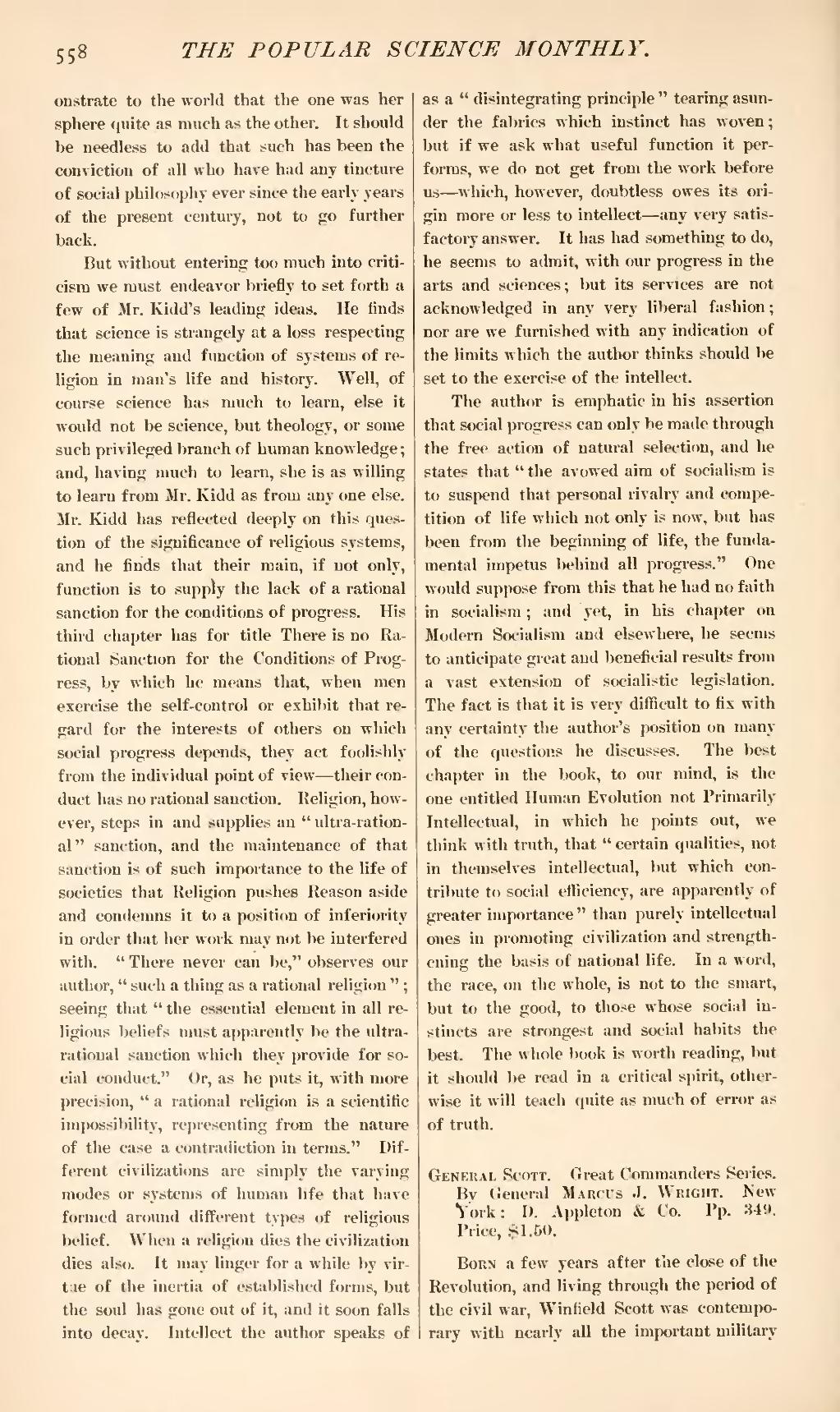onstrate to the world that the one was her sphere quite as much as the other. It should be needless to add that such has been the conviction of all who have had any tincture of social philosophy ever since the early years of the present century, not to go further back.
But without entering too much into criticism we must endeavor briefly to set forth a few of Mr. Kidd's leading ideas. He finds that science is strangely at a loss respecting the meaning and function of systems of religion in man's life and history. Well, of course science has much to learn, else it would not be science, but theology, or some such privileged branch of human knowledge; and, having much to learn, she is as willing to learn from Mr. Kidd as from any one else. Mr. Kidd has reflected deeply on this question of the significance of religious systems, and he finds that their main, if not only, function is to supply the lack of a rational sanction for the conditions of progress. His third chapter has for title There is no Rational Sanction for the Conditions of Progress, by which he means that, when men exercise the self-control or exhibit that regard for the interests of others on which social progress depends, they act foolishly from the individual point of view—their conduct has no rational sanction. Religion, however, steps in and supplies an "ultra-rational" sanction, and the maintenance of that sanction is of such importance to the life of societies that Religion pushes Reason aside and condemns it to a position of inferiority in order that her work may not be interfered with. "There never can be," observes our author, "such a thing as a rational religion"; seeing that "the essential element in all religious beliefs must apparently be the ultrarational sanction which they provide for social conduct." Or, as he puts it, with more precision, "a rational religion is a scientific impossibility, representing from the nature of the case a contradiction in terms." Different civilizations are simply the varying modes or systems of human life that have formed around different types of religious belief. When a religion dies the civilization dies also. It may linger for a while by virtue of the inertia of established forms, but the soul has gone out of it, and it soon falls into decay. Intellect the author speaks of as a "disintegrating principle" tearing asunder the fabrics which instinct has woven; but if we ask what useful function it performs, we do not get from the work before us—which, however, doubtless owes its origin more or less to intellect—any very satisfactory answer. It has had something to do, he seems to admit, with our progress in the arts and sciences; but its services are not acknowledged in any very liberal fashion; nor are we furnished with any indication of the limits which the author thinks should be set to the exercise of the intellect.
The author is emphatic in his assertion that social progress can only be made through the free action of natural selection, and he states that "the avowed aim of socialism is to suspend that personal rivalry and competition of life which not only is now, but has been from the beginning of life, the fundamental impetus behind all progress." One would suppose from this that he had no faith in socialism; and yet, in his chapter on Modern Socialism and elsewhere, he seems to anticipate great and beneficial results from a vast extension of socialistic legislation. The fact is that it is very difficult to fix with any certainty the author's position on many of the questions he discusses. The best chapter in the book, to our mind, is the one entitled Human Evolution not Primarily Intellectual, in which he points out, we think with truth, that "certain qualities, not in themselves intellectual, but which contribute to social efficiency, are apparently of greater importance" than purely intellectual ones in promoting civilization and strengthening the basis of national life. In a word, the race, on the whole, is not to the smart, but to the good, to those whose social instincts are strongest and social habits the best. The whole book is worth reading, but it should be read in a critical spirit, otherwise it will teach quite as much of error as of truth.
General Scott. Great Commanders Series. By General Marcus J. Wright. New York: D. Appleton & Co. Pp. 349. Price, $1.50.
Born a few years after the close of the Revolution, and living through the period of the civil war, Winfield Scott was contemporary with nearly all the important military

